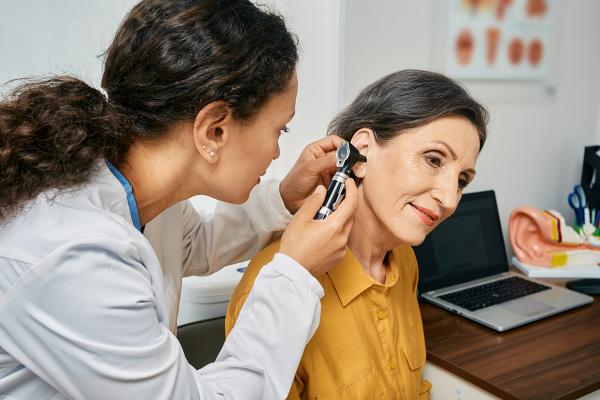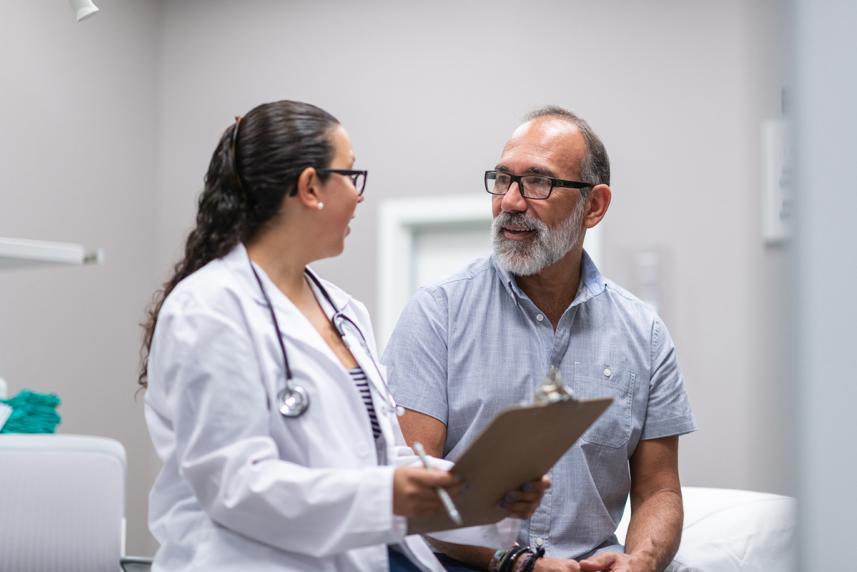
EPIC Hearing Healthcare helps members access hearing exams, hearing aids and more. Sign in to learn more and check eligibility.
That sharp pain in your ear or muffled hearing could be a sign of a serious condition. Find out what it is and how to treat it.

Maybe you had a bad ear infection recently. Or you traveled on a plane with a cold. Or you tried scuba diving on vacation. What do all these scenarios have in common? They may cause a ruptured eardrum, which is painful and could harm your hearing.
Here’s what to know and how to keep your eardrums safe.
A ruptured eardrum is a hole or tear in that part of your ear, says Viral Tejani, Au.D., Ph.D. He’s an assistant professor of otolaryngology–head and neck surgery at Case Western Reserve University School of Medicine in Cleveland. “The eardrum separates your outer ear, or ear canal, from your middle ear, where the 3 middle ear bones are,” he explains.
The eardrum has several functions. It helps you hear by vibrating when sounds travel from the outer ear. Those vibrations turn into signals that go to the brain.1 The brain then translates them into the sounds you hear. The eardrum also protects your middle ear from bacteria, water and dust.1
Ruptured eardrums are not uncommon – about 2% of the population currently has one.2 “They tend to occur more frequently in children, compared to older adults,” notes Anish Thakkar, Au.D. He’s an audiologist at the Los Angeles Center for Ear, Nose, Throat and Allergy in Los Angeles.
Picture a hole in a snare or bass drum. That’s what essentially happens with a ruptured eardrum. When it has a hole, sound can’t move as effectively through your middle ear bones, Thakkar explains. The result: hearing loss.
The medical term for a ruptured eardrum is tympanic membrane (TM).1 If you are diagnosed with one, that’s what you may see in your medical chart.

EPIC Hearing Healthcare helps members access hearing exams, hearing aids and more. Sign in to learn more and check eligibility.
The most common cause is a middle ear infection, says Thakkar. If you have one, fluids may build up in your ear, which presses on your eardrum and could cause it to burst. Other causes include:3
A ruptured eardrum may happen to anyone. But it’s more likely if you already have fluid in your ears. This could cause eustachian tube dysfunction (ETD). ETD prevents your middle ear space from equalizing pressure with the outside world, explains Thakkar.
If your ear hurts, like the pain from an ear infection, you may find that it feels better once your eardrum bursts.3 But once that happens, you might notice:1, 4
If you think that you have a ruptured eardrum, see an ear, nose and throat doctor (ENT). They can look into your ear with a lighted device called an otoscope. If there’s just a small hole, they may recommend initially that you watch and wait. “TM perforations can heal on their own in many cases, if they’re small,” says Tejani.
As you wait, there are some simple things you can do at home to ease pain and speed up recovery. They include:3
Your ENT may also prescribe antibiotic eardrops to prevent infection.
If your eardrum heals on its own, your hearing should return to normal. If it doesn’t, an ENT may recommend one of these medical procedures:1
There are some steps that may help lower the odds of a ruptured eardrum:1, 4, 5
The good news: Hearing loss from a ruptured eardrum is often temporary.4 Usually, patients can regain hearing after they recover, notes Thakkar. But your hearing may not be exactly as it was before, he adds. If that’s the case, it’s a good idea to talk to your ENT or primary care provider. They may recommend further treatment.
Take care of your hearing: Did you know that many hearing benefits, including a hearing exam and consultation, are covered through EPIC Hearing Healthcare? Learn more.
Sources
Information is for educational purposes only and is not a substitute for the advice of a licensed medical provider. Consult your provider prior to making changes to your lifestyle or health care routine.
Other providers are available in our network.